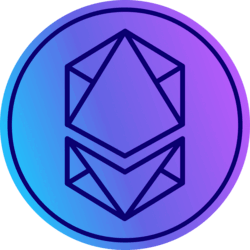Terra (LUNA) evolved into Terra 2.0, emphasizing community governance and stake-driven security for decentralized applications. More
| Fully Diluted Valuation | $154.29M |
|---|---|
| 24H Trading Volume | $16.93M |
| 24H Low / High | $0.14 / $ 0.14 |
| Circulating Supply | 687.66M |
| Total Supply | 1.08B |
| Max Supply | ∞ |
| Categories | Alleged SEC Securities 7 more |
|---|---|
| Founder | Daniel Shin 1 more |
| Website | terra.money |
| Socials | 8 more |
| Chains |
Osmosis Ecosystem
1 more
|
| Explorer | Mintscan 4 more |
| Contracts |
|
| Name | Pair | OG Score |
|---|
The journey of Terra (LUNA) has been marked by resilience and evolution, transitioning from the challenges faced by Terra Classic to the emergence of Terra 2.0. Terra, founded in January 2018 by Daniel Shin and Do Kwon, initially introduced the algorithmic stablecoin TerraClassicUSD (UST) within the Terra Classic blockchain. However, a bank run in May 2022 triggered a crash that devalued LUNA to nearly zero, leading to the birth of a new chain, Terra 2.0.
Terra 2.0, launched on May 27, 2022, distinguishes itself by discontinuing support for stablecoins and focusing on a decentralized, community-driven approach. The LUNA token, central to Terra's ecosystem, serves as both a governance and utility token. LUNA holders actively participate in the network's governance, voting on proposals to shape the future development of Terra. The transition from Terra Classic to Terra 2.0 involves a unique airdrop to Luna Classic stakers and holders, underlining the commitment to community ownership.
The Terra blockchain, secured through a proof-of-stake consensus algorithm, utilizes Tendermint, with LUNA token holders staking their tokens for transaction validation and earning rewards. Terra's evolution aims to maintain its position as a hub for decentralized applications (dApps), with notable projects like Astroport, Prism, RandomEarth, OnePlanet, and Stader expressing their commitment to migrating to Terra 2.0. As Terra 2.0 unfolds, the emphasis on community-driven governance, enhanced user experience, and continued development showcases the project's determination to overcome challenges and offer a resilient blockchain ecosystem.
Terra (LUNA) stands out for its transition to Terra 2.0, emphasizing community governance, stake-driven security, and support for decentralized applications, distinguishing it from its predecessor.
Terra (LUNA) was founded in January 2018 by Daniel Shin and Do Kwon, visionaries who aimed to drive blockchain adoption through stability and usability.
Terra (LUNA) has garnered support from Coinbase Ventures, PolyChain Capital, Pantera Capital, HashKey Capital, Binance Labs, Galaxy, Delphi Digital and others.
You can buy Terra (LUNA) on Binance, MEXC, Bitget, Gate.ioBybit cryptocurrency exchanges.
This website uses cookies to enhance your experience. Please see our Cookie Policy.




